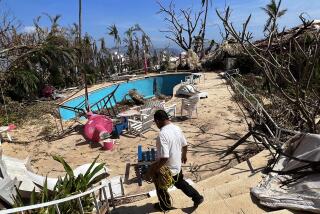In Chilly Waters, Dedicated Visitors Learn Vital Skills
Fredy Ramirez’s swimming skills were so raw that he looked more like the rescued than the rescuer. Javier Hernandez nearly brought up the rear in the running portion of the endurance test.
Neither would have passed the eight-day test to become a state lifeguard, but that wasn’t the reason they had come to Huntington Beach.
They came to the land of chilly water and strong currents so they could teach others how to save lives in the balmy waters off Cabo San Lucas in Baja California, where, Ramirez said, 18 people drowned last year.
“It’s a unique talent they have now,” Huntington Beach state lifeguard Eric Dymmel said. “ ... They’ll leave here with the skills and abilities to save lives down there.”
Since the late 1990s, California lifeguards have been visiting Acapulco to train lifeguards there. They’ve also sent down old equipment with the hopes of bolstering a profession that barely exists in Mexico. Two years ago, an experienced lifeguard from Acapulco came to Huntington Beach for the eight-day training and performed very well.
The visit by Ramirez and Hernandez, which ends today, marks the first time prospective lifeguards from Mexico have gone through the state lifeguard training program, said Mike Silvestri, a Huntington Beach training coordinator.
“Hopefully this can be the beginning of a lifeguard training program for Mexico,” he said. “As someone who has a home near Cabo, I certainly see the need. Every time I’m down there, it seems like I make a rescue.”
The informal exchange program was arranged by two Cabo residents who are also California lifeguards, one from Santa Cruz and the other from Los Angeles County. Ramirez, 22, a firefighter, and Hernandez, 29, a paramedic, were chosen for the state lifeguard academy based on their attitude and physical skills.
Silvestri said both men have exceeded expectations.
“They could have come up here and just sat back and observed,” he said. “But these guys will run through a brick wall if they have to. Their dedication is amazing.
“If we had them for another two or three months, they’d probably both be certified lifeguards.”
By then, they might be frozen stiff. Even with wetsuits, the 20-degree temperature change was brutal for Ramirez and Hernandez, who typically swim in mid-80-degree water off Cabo.
“Between the cold water and the currents, I had a lot of trouble just going out into the ocean to swim,” Ramirez said through an interpreter. “It was a real struggle.” But Ramirez said he fares much better in the water than many residents and tourists who swim off the shores of Cabo.
“Hardly anybody [among the Mexicans] knows how to swim,” he said. “And if you add alcohol to that, you get a lot of accidents and drownings.”


